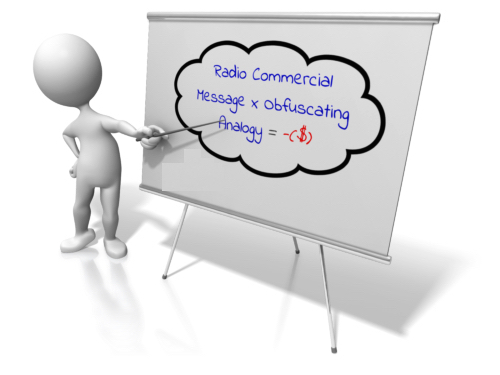 Here’s yet another example of the Inane Radio Copywriting Gimmick of the 2010’s:
Here’s yet another example of the Inane Radio Copywriting Gimmick of the 2010’s:
Using analogies to explain a concept the consumer already understands.
Raise your hand if you’ve ever compared “squeaky toys” for a dog.
If you didn’t raise your hand, you were excluded from that commercial message.
Did you understand what she was saying after she mentioned comparing restaurants?
At first I thought she was saying, “You compare flights.”
But I wasn’t sure, so I listened to it again.
And again and again.
Via my desktop computer’s speakers; via my laptop’s speakers; via earbuds.
No matter how many times I listened to it, I couldn’t determine for certain what that word was.
I had several friends listen to that spot. After much back-and-forth discussion, the consensus was that she probably was saying “flights.”
Or flies.
Or sides.
Or size.
Or slides.
I’ve flown roughly 3 million miles during the past 30 years. But still I wasn’t sure what she was talking about.
That’s a production problem.
Or, ultimately, a quality control problem. The ad agency didn’t take the time to make sure that people who knew nothing about this advertising campaign could understand all the words…as well as the Core Message of the commercial.
Lots of people rarely, if ever, take airline flights.
When you say to them, “You compare flights,” they respond (assuming they understand you’re saying “flights” and not “flies”), “No, I don’t.”
Those listeners realize that whomever you’re talking to, it’s not them.
The analogy doesn’t even make sense. What do restaurants, flights, and Spike’s squeaky toys have to do with your credit card?
Actually, a connection could be made: You pay for your restaurant meals, airline flights and toys for your pets with a credit card.
You could make that connection, but why would you bother?
That approach is the equivalent of advertising toothpaste by saying:
“You want your car to be clean. You want your dog to be clean. So…Why not make sure your teeth are clean?”
Question for the Copywriter of this Radio Ad
“Why did you begin the spot by talking about restaurants, flights and Spike’s squeaky toys?”
The concept of “choosing the best credit card for you” isn’t difficult for the average consumer to understand.
That opening is like saying to a friend:
“You need to provide your automobile with fuel to keep it running. You need to recharge the batteries of your heat seeking attack drone to wreak devastation upon your neighbor’s yard. Well — try to stay with me here — your body needs fuel, too. Where does your body get that fuel? From food. So…You wanna go get a pizza?”
The service NerdWallet offers isn’t about choice; it’s about “the best credit card for me.”
But they don’t mention “best credit card for you” until 19 seconds into the commercial
That’s 1/3 of the spot wasted.
But Wait, There’s Less!
They first mention “best credit card for you” at 19 seconds in.
But what do they mean by “best credit card for you?
Do they mean
Lowest interest rate?
Airline or hotel points?
% cash back on annual purchases?
Lowest late payment penalties?
Special relationships with other services (e.g., discounts at restaurants)?
No additional surcharges on overseas purchases ?
Or even “most widely accepted”? (Sorry, Discover Card).
They don’t begin to define “best credit card for you” until :24 — after they’ve wasted 40% of their commercial time.
They even believe it’s necessary to illustrate for the radio listener the concept of “fast.”
In addition to needlessly providing us with a metaphor for “fast,” they do it badly.
When you say your website provides the information the visitor wants “…fast,” people instantly get an image in their minds of what “fast” means.
For example, they might envision typing in a few words, clicking on a button and then instantly being shown the best option for them.
When you say “Like we bet it takes longer to brush your teeth fast,” their image changes…probably for the worse.
It’s possible that you find brushing your teeth to be the highlight of your day; when you’re done, you wish it could’ve taken longer.
Unlike you, I find brushing my teeth to be a tedious, annoying, necessary task.
NerdWallet has managed to get me to associate the experience they provide with my annoying experience of brushing my teeth.
We critique movies. We critique debate performances. We critique pitches given on Shark Tank. So why not critique radio commercials?
Are you having an “a-ha” moment?
I didn’t think so.

